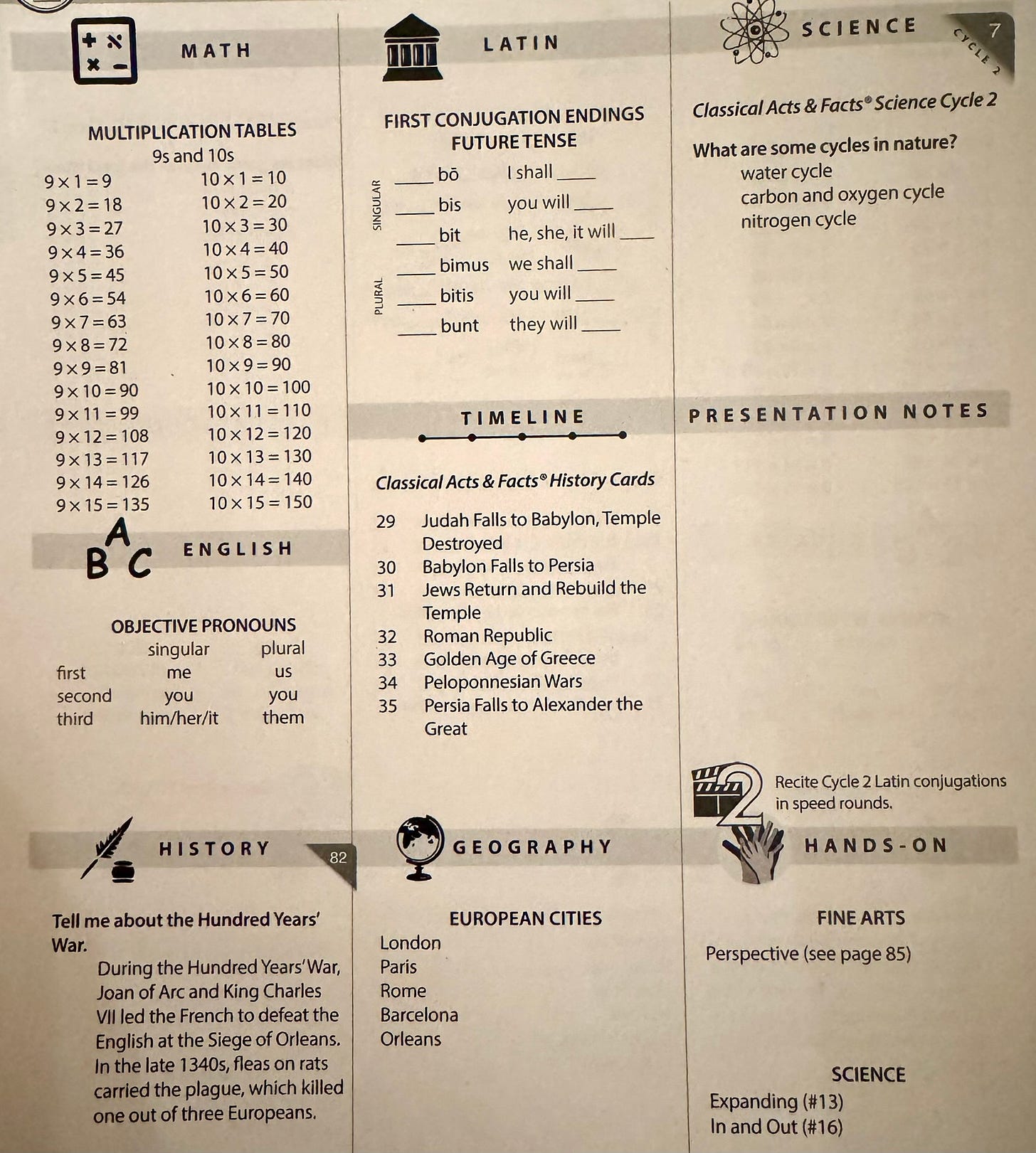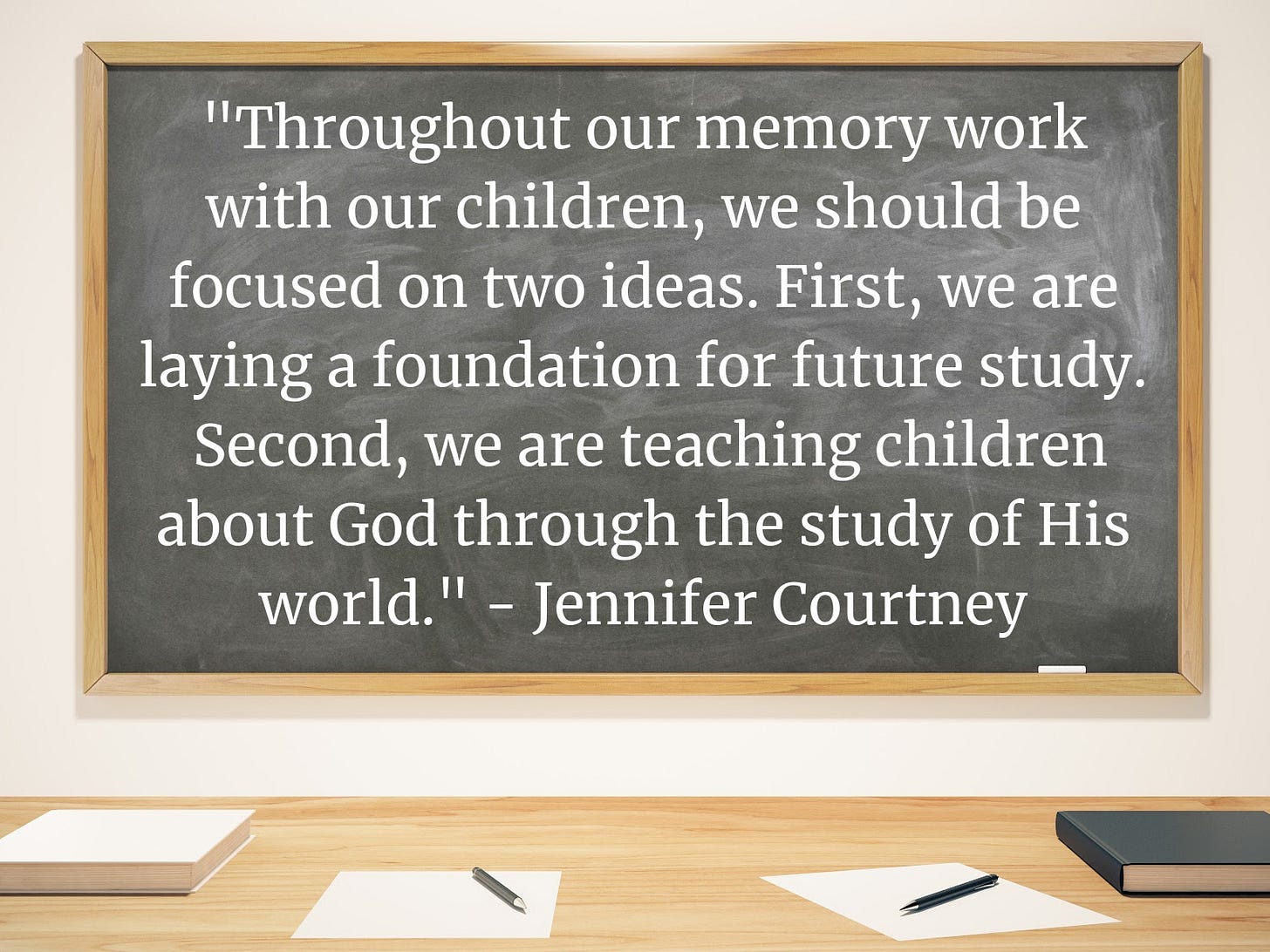A Case for Memory Work, and 28 Things to Memorize (as a family or just myself!)
Our family joined a Classical Conversations Community this fall, and it has been a fun new adventure for all of us! Five weeks into my journey with Classical education, I’m hardly an expert, but it has taken no time at all to gather that memorization is a key aspect of the Grammar stage (grades K-6). Why memory work? Leigh Lowe of Memoria Press (a Classical curriculum company) explains:
“We use memorization to build a foundational base of knowledge and to fill the hearts and heads of our students so they may write, speak, and think with clarity, truth, and beauty. The facts, Scripture, poetry, songs, and literary passages memorized by students are formative and life giving. They become the truths to which they will cling, the stories to which they will allude, the resources to which they will refer, and the facts with which they will persuade throughout the whole of life. The well-educated person, who has a head and heart full of meaningful knowledge, is a better writer, speaker, thinker, and servant because he or she has an overflowing fount of resources within, ready for access at any time.”
Our Foundations curriculum has more to say on the subject:
“The Foundations program is designed to prepare students to become confident thinkers, debaters, speakers, and leaders later in life. By memorizing a standard body of information, students can progress much more easily through a new subject and move more quickly into critical thought. More importantly, as Christians, our children should know who did what, where, when, and why for Him. They should see His creation revealed through science. His word is a lamp unto our feet—and theirs, too. That means we must acquire, nature, and expand our ability to store information, words and abstract ideas.”
Hence, lots of memorization. Each week at our CC community day, our tutors teach us a set of facts from seven categories/subjects: Math, English Grammar, Latin Grammar, Geography, Science, and History—seven timeline events and one history sentence about a significant individual or time period. (Below is an overview our memory work for just this week.) We also are spending the year memorizing Genesis chapter 1 as a school community.
We play games and use songs and chants to introduce each week’s facts in class, and then we review them throughout the week at home. Our family’s morning walks have become our Memory Work time, and the walks are getting longer—verging on an hour—as we add more to our memorization practice every week. We also review facts at random points throughout the day, and we listen to review songs in the car. I had done some memory work with my kids prior to this year, but now we are in full-blown memorization mode. . . and we are loving it! It’s pretty cool to be able to shout out, “someone tell me what happened on Day Five of creation” or “list the first conjugation present tense Latin endings” and have my Kindergartners give me an answer!
This new foray into hard core memory work has me thinking about some things that would be fun to memorize—either as a family, or just for myself (I’ll let you guess which of these items fall in that just-for-me bucket). Today’s “28 Things” is a portion of that list. As you will see, not every item on this list is of equal importance or difficulty level. But I do think that everything on this list would be interesting or at least FUN to have committed to memory. And because I love being able to check some items off a list right away, there are a few things on here that I’ve already memorized, and even a couple that the kids are already on their way to memorizing too.
BIBLE
1. The five verses of the Roman Road
2. The Sermon on the Mount (Matthew 5-7)
3. Psalm 119
4. A full book of the Bible (Ephesians or Philippians)
5. A simple catechism
HISTORY & GEOGRAPHY
6. US Presidents (and First Ladies!)
7. Declaration of Independence
8. Preamble to the Constitution
9. The Gettysburg Address
10. Bill of Rights (or all 27 Amendments to the Constitution)
12. 50 states and their capitals
13. The name, location, and capital of every country
SCIENCE
14. Periodic table of elements
15. Bones, muscles, and systems of the body
16. Name, order, and facts about each planet in our solar system
LANGUAGE TOPICS
19. Morse Code
20. The Braille Alphabet
21. Greek alphabet/ Greek & Latin root words, prefixes, and suffixes
23. Common idioms and their meanings
24. Colors, Numbers 1-10, and “Hello” in several languages
CULTURE
25. Birthstone and birth flower for each month
26. Top Ten baby boy & girl baby names by decade
27. Newberry award winning books (1922-present day)
28. A dozen significant poems (like these)
How do you feel about memory work? Is memorization a practice that you find enjoyable or useful? What are some things you have memorized (or would like to) that you would add to my list?





